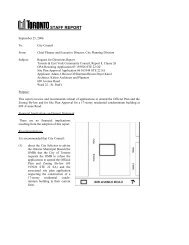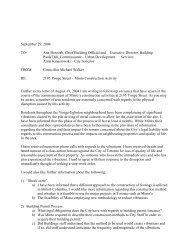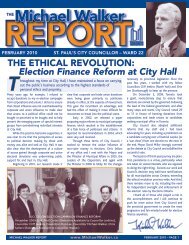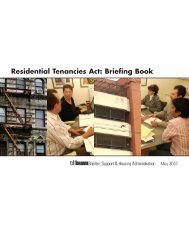Residential Tenancy Reform Consultation Paper
Residential Tenancy Reform Consultation Paper - Michael Walker
Residential Tenancy Reform Consultation Paper - Michael Walker
Create successful ePaper yourself
Turn your PDF publications into a flip-book with our unique Google optimized e-Paper software.
RESIDENTIAL TENANCY REFORM CONSULTATION PAPER<br />
Dispute resolution – default process<br />
The Ontario Rental Housing Tribunal (the Tribunal)<br />
resolves disputes between landlords and tenants and<br />
its decisions have a significant impact on the parties<br />
involved. Developing procedures that are fair and workable<br />
for both landlords and tenants is a priority for the<br />
government. Below are some areas under consideration<br />
for reform.<br />
Background:<br />
Most applications to the Tribunal are for eviction. For most<br />
types of eviction applications, the Tribunal may issue a<br />
default order if the tenant does not file a written dispute.<br />
When a landlord files an application with the Tribunal to<br />
evict a tenant, a hearing is scheduled. The landlord then<br />
serves a copy of the application and the notice of hearing<br />
to the tenant. However, if the tenant does not file a written<br />
response disputing the application with the Tribunal within<br />
five days, the Tribunal can cancel the hearing, and issue a<br />
default order evicting the tenant, based on the details of<br />
the landlord’s application.<br />
This default order stands unless the tenant requests that it<br />
be “set aside” within 11 days. If the tenant requests a set<br />
aside, a hearing is scheduled. The tenant must first demonstrate<br />
that there was a valid reason why he/she did not<br />
dispute the original application on time before the order<br />
will be changed.<br />
This process applies to most eviction applications, and to<br />
some tenant applications, such as applications for illegal<br />
rent or illegal charges.<br />
A large percentage of tenants (approximately 70 per cent)<br />
do not respond to eviction applications, or show up at<br />
hearings. Without a default process, hearing time has to<br />
be scheduled for all cases, even though often the tenant<br />
will not attend. Requiring a written dispute to be filed<br />
ahead of time speeds up the process and reduces costs.<br />
This process has been strongly criticized by tenant advocates<br />
and the Ontario Ombudsman. They argue that the<br />
process is confusing to tenants, that the five-day dispute<br />
deadline is too short, and that denying tenants hearings in<br />
these cases is unfair. Tenant advocates have also argued<br />
that the “set aside” process is unfair.<br />
Questions for consideration:<br />
How can the dispute resolution process be made<br />
fairer?<br />
A. Remove the default process.<br />
The government is considering ending the default process<br />
altogether by removing the requirement for tenants to<br />
dispute in writing in order to have a hearing on an application.<br />
Instead, a tenant would automatically have the<br />
opportunity to attend a hearing when the landlord filed<br />
an application to evict them. This would remove the need<br />
for the Tribunal to inform tenants and landlords about the<br />
default process, and about the fact that the hearing might<br />
be cancelled if the tenant fails to dispute the application.<br />
However, sending all applications to hearing would mean<br />
the Tribunal would take several days longer to issue most<br />
orders. In cases of arrears, this would increase the amount<br />
of rent owed to landlords. As well, landlords would be<br />
required to appear at all hearings, even in cases where the<br />
tenant had no intention of participating, costing the landlord<br />
extra time and expense. Finally, removing the default<br />
process would increase the costs to the Tribunal to resolve<br />
applications.<br />
B. Make changes to the default process, such as<br />
giving tenants longer than five days to respond,<br />
allowing tenants to respond by phone or e-mail<br />
(instead of only in writing) or giving tenants more<br />
opportunities to argue against the eviction order.<br />
Another option is to keep the default process, but change<br />
it to make the process simpler and fairer for tenants.<br />
20






